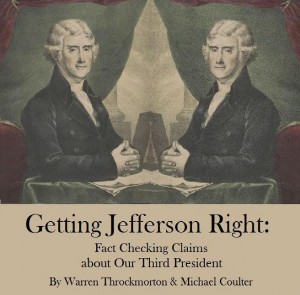 Last week, Eric Metaxas had David Barton on his radio show and told the audience that he loved Barton and his work. He also said he used some of Barton’s work to help write his new book If You Can Keep It. That book has been the subject of many critical reviews.
Last week, Eric Metaxas had David Barton on his radio show and told the audience that he loved Barton and his work. He also said he used some of Barton’s work to help write his new book If You Can Keep It. That book has been the subject of many critical reviews.
They also briefly discussed Barton’s pulled-from-publication book, The Jefferson Lies. In particular, Barton claimed to enlighten the audience about what is commonly known as the Jefferson Bible. Metaxas started to ask Barton a question about Jefferson’s editing of the Gospels, and Barton jumped in to explain.
I have addressed this story before but want to write a series of posts to show that Barton’s story is mostly fiction. Today, I start with the audio, the transcript and address a few of the key claims. First, the audio segment:
Transcript (the words in bold print are either untrue or highly questionable):
Metaxas: Jefferson is perceived as being rather secular, that he excised the Bible, rather the New Testament to remove the miracles and the…
Barton: Can I jump in on that one for a second because that is the one that Christians will repeat the most often?
Metaxas: Right, of course.
Barton: And I say Jefferson cut out all the supernatural, the stuff he didn’t like? And they say, Yeah. What are you talking about? They say, the Jefferson Bible. I say, really? Yeah, the Jefferson Bible. I say, which one? First off, they didn’t know there were two. And I say, yeah there’s the 1804 and an 1820 so which one so which one are you talking about? And so then I say, have you read either one of them? Well, no. How do you know he cuts it out? Well, that’s what they always say. Well, let me tell you about the 1804 and then go to 1820.
In 1804, Jefferson was given a sermon by a friend named, excuse me 1803, he got a sermon by a friend named Edward Dowse and the sermon was by William Bennet an evangelical in Scotland that says if you want to reach the American Indians do not give them the Bible because they might read Leviticus, they might read the genealogies, he said give them excerpts out of the Bible.
So Jefferson read that sermon, he then goes to the White House and takes two White House Bibles and he cuts out the teachings of Jesus, what we would call the red letters of Jesus. He pasted them end-to-end. He gave that to a missionary friend and said look, this is a lot cheaper than printing the Bible and its got the teachings. In that, he has the dead being raised, Jesus is raising the dead, Jesus healing the sick, Jesus cleansing lepers, Jesus is the son of God, resurrection, heaven, hell, angels. But wait! I thought he cut out all that sp__, no, it’s there.
The second one he did was in 1820. And he said, and by the way, every University in America back then required you to take a course in moral philosophy, every theological school, same thing. And so he [Jefferson] lists nearly 20 writers where he read their moral writings and he concluded that Jesus was better than all of them.
So he went through in 1820 and found 81 moral teachings of Jesus, he compiled them end to end. He called the book the life and morals of Jesus of Nazareth, and it was the stuff like the great commandment, love God with all your heart soul and mind. It was turning the other cheek, it was forgiveness, it was the good Samaritan, it was the Golden Rule, and that’s what he did in four languages. Nobody knew that existed until 1886, and Cyrus Adler the Secretary of the Smithsonian found it from Jefferson’s grandson, they bought it , they got it to Congress and in 1902, US representative John Lacey said you know this is so great, if we could just live by the teachings of Jesus. So Congress printed 9,000 copies and for 50 years if you were a Freshman in the House or Senate, they gave you the life and morals of Jesus, read this and you’ll stay out of trouble.
Metaxas: Unbelievable.
Barton: Now wait a minute what happened to this stuff about hating. Let me point out that Jefferson was a lifetime member of the Virginia Bible Society, the third largest contribution he gave in his life was to the Virginia Bible Society, when his kids and grandkids learned to read, he gave them a Bible to read, he’s a funder of the John Thompson Bible, the largest Bible ever done in America, he’s a funder of the Thomas Scott Bible, he tried to fund the Charles Thomson Bible. If Jefferson hates the Bible, why does he keep doing this stuff? See that’s one of the seven lies we’ve been told about Jefferson. And everybody repeats what they’ve heard. Read it for yourself. It doesn’t cut out the miraculous, or the supernatural. Read it for yourself.
William Bennet’s Sermon
The first false claim is that William Bennet’s sermon gave instructions about how to reach the Indians with the Gospel. I don’t know why Barton keeps making this claim. He made it in the first edition of The Jefferson Lies and often repeats in his media appearances (e.g., Jesse Peterson show) but he walked it back in the recently published second edition. Furthermore, Mark Beliles, an writer used by both Barton and Metaxas as an authority, told me that Barton is wrong about the content of that sermon. In an email, Beliles said:
Yes, Barton overstated the case about that sermon itself. But the sermon clearly promoted the importance of getting Jesus’ morals found in the gospel into the hands of missionaries of the society, and they of course were going to Indians as well as other groups.
Barton did more than overstate the case. Bennet in his sermon didn’t mention mission work to Indians and certainly didn’t tell readers to withhold a Bible from Indians because they might read Leviticus or the genealogies. He didn’t encourage readers to cut up the Gospels and give the Indians a resurrection-free version of the Gospels. Barton just made that up. Don’t believe me? Click the link and read the sermon for yourself.
Why Did Jefferson Cut Up the Gospels?
Barton makes it sound like Jefferson read this sermon and then immediately went to the White House Bibles with knife in hand. One must pause to understand the timing. Edward Dowse sent Bennet’s sermon to Jefferson in April 1803 (read the entire correspondence here). Jefferson didn’t make his first extraction from the Gospels until March 1804.
In this case, we have Jefferson’s own words about why he cut up the Gospels. To Adrian Van Der Kemp in 1816, Jefferson wrote about his extraction:
I made, for my own satisfaction, an Extract from the Evangelists of the texts of his morals, selecting those only whose style and spirit proved them genuine, and his own: and they are as distinguishable from the matter in which they are imbedded as diamonds in dunghills. a more precious morsel of ethics was never seen. it was too hastily done however, being the work of one or two evenings only, while I lived at Washington, overwhelmed with other business: and it is my intention to go over it again at more leisure. this shall be the work of the ensuing winter. I gave it the title of ‘the Philosophy of Jesus extracted from the text of the Evangelists.’
Jefferson referred to this extraction to John Adams, Benjamin Rush and others. In no place, did he refer to the sermon from Bennet or the letter from Dowse as having anything to do with his desire to cut up the Gospels. Jefferson said he selected only those texts “whose style and spirit proved them genuine, and his [Jesus’] own.” Jefferson said the real words and deeds of Jesus were “as distinguishable from the matter in which they are imbedded as diamond in dunghills.”
Regarding the 1804 effort, Jefferson refers to it as a text “of his [Jesus] morals.” In both efforts, Jefferson was going for a compendium of the moral teachings of Jesus which Jefferson believed to be the actual teachings (diamonds) and not material added by the disciples and Gospel writers (dunghill). Let that sink in a minute. Jefferson presumed to know what parts of the Gospels were really true and which were added and not genuine.
Barton is correct that there were two efforts but because of his story about Bennet’s sermon, he artificially makes Jefferson have two purposes. This is misleading.
Relevant to that point, I challenge Barton or Metaxas to identify the missionary who received Jefferson’s 1804 version. No primary source evidence exists that Jefferson ever gave the extraction to anybody.
What Is In The Jefferson Bible?
In fact, when Barton tells Metaxas’ audience to go read the 1804 version, he knows they can’t. There is no actual copy in existence. We have the tables of texts Jefferson wrote to help guide him in his work and we have the cut up Bibles as well. However, we don’t know for sure what ended up in the version since we don’t have it. We do have the 1820 (in the neighborhood of 1820, it is not known exactly when he finished it) which you can read here.
In the next post on Barton’s story on the Metaxas show, I will take up the question about miracles in the 1804 version. We can’t be as sure what was in that one as in the 1820 version but we aren’t completely in the dark as I will discuss in that post. In the mean time, one can see the following posts on that topic, or get my book with Michael Coulter, Getting Jefferson Right: Fact Checking Claims about Our Third President.
Is the Jefferson Bible All the Words of Jesus? Part One
Is the Jefferson Bible All the Words of Jesus? Part Two
Are the Miracles of Matthew 9 in the Jefferson Bible?



